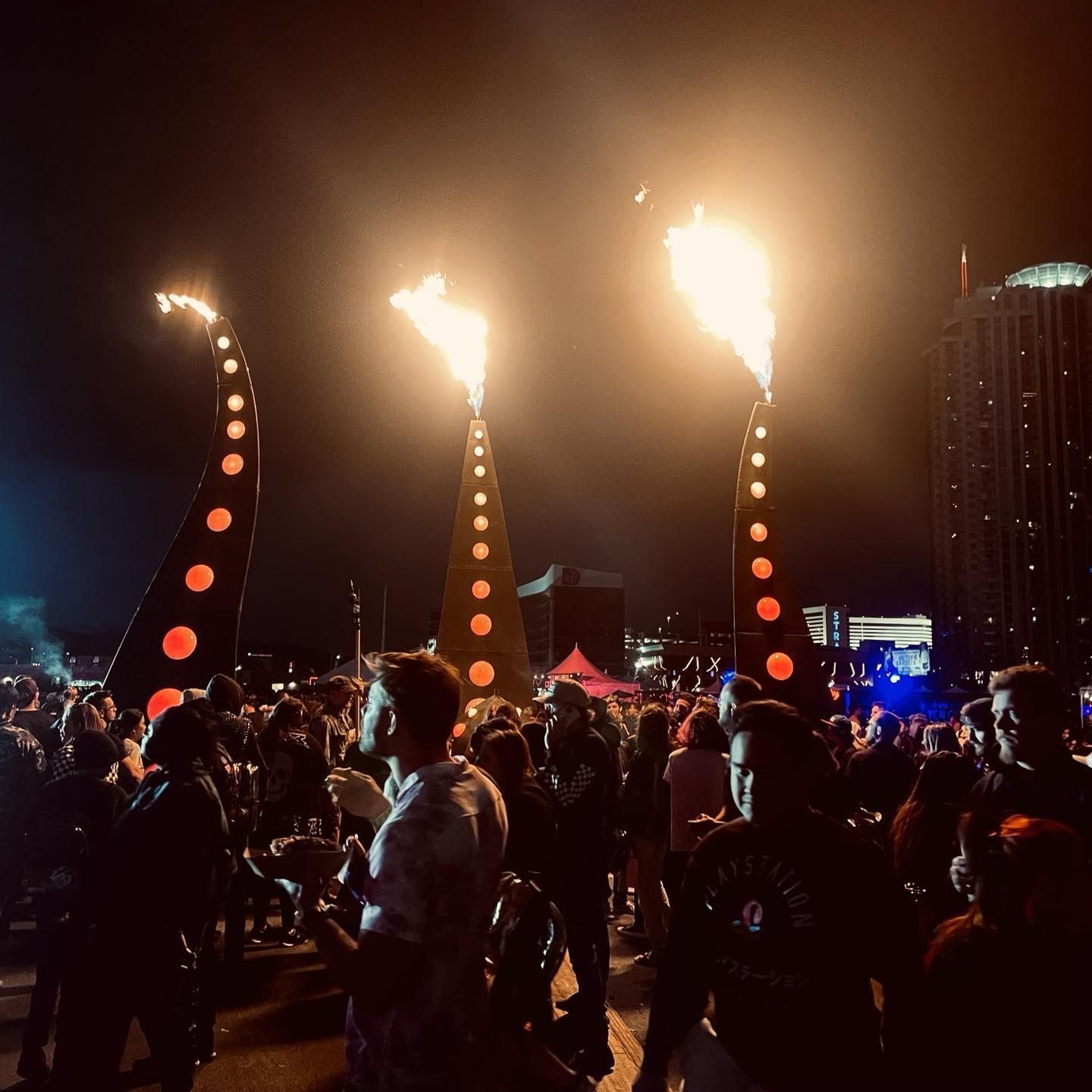#Spiruvious had an amazing show @whenwewereyoungfest Big thanks to the producers and curators for having us out. We love doing home town shows and this was one for the books. #largeart #fireart #ledart #burningpropane #propaneaccessories #poofers #festivalart #lasvegasfestivalgrounds
BLOG
International Deadline: November 30, 2022 – ArtAscent Art & Literature Journal is a theme-based, juried, bi-monthly, international art magazine that showcases exciting emerging and indie artists and writers…
From Dance/USA: “In Spring 2020, COVID-19 set off a wave of performance and residency cancellations. The termination of contracts through the invocation of Force Majeure was devastating to artists, managers, presenters and in some cases, to their relationships. By June 2020, Dance/USA members from the Agents, Managers, Producers and Promoters (AMPP) Council and the Presenters Council formed a Joint Working Group to address the question: ‘Can we identify some practical ways to support more equitable partnerships and financial balance within our already fragile dance touring ecosystem.'”
“Over the course of 7 months, members of the Joint Working Group discussed, tested and put into practice various remedies and hypotheses, culminating in the creation of Equitable Contracting, a shareable, living document meant to specifically address imbalances in contracting and the Force Majeure process.”
“The group outlined three principles:
I. Fair and Equitable Contracting: ‘Engagement’ vs. ‘Performance’
II. Fair and Equitable Payment Structures: ‘Payments & Deliverables’ vs. ‘Deposit’
III. Fair and Equitable Force Majeure/Cancellations: ‘Just because it’s legal, doesn’t mean it’s good business.’ Force Majeure does not have to mean immediate termination”
“To gain access to the document, please complete the form here – it is available to all in the field. While the document does not provide specific contract language, the hope is that it may offer some practical ideas and suggestions for contracts that support more equitable business practices and field wide sustainability.”
“A massive 40,000-word report on cryptocurrency that appeared on Bloomberg stirred some controversies.”
“According to the article written by journalist Matt Levine, ‘every web3 project is simultaneously a Ponzi scheme,’ as most tokens are purchased with the purpose of selling them for a higher price, and not because the buyers want the product. According to Levine, the NFT is technologically weak, there’s a general negative sentiment about the tokens, and legal grounds of ownership are concerning, considering that buying an NFT buys you a notation on the blockchain, giving you the ownership of a web server and not the token itself.”
“With few notable exceptions, including nonfungible tokens made on the Art Blocks platform, the majority of NFTs are not on the blockchain directly but are on the server that is on the blockchain. Kevin McCoy, an early inventor of the NFTs, on the other hand claims that despite abuses, the NFTs do have collector’s value as pieces of digital art.”
“The Doris Duke Charitable Foundation (DDCF) today announced the promotion of Maurine Knighton to chief program officer. In this role, Knighton will oversee DDCF’s five national grantmaking programs: Arts, Environment, Medical Research, Child Well-Being and Building Bridges.” Maurine Knighton is also a board alum of Grantmakers in the Arts.
“‘Maurine is a visionary, driven and skilled leader,’ said Sam Gill, CEO and president of the Doris Duke Charitable Foundation. ‘In a moment that calls for creativity and dexterity, Maurine’s wisdom and experience will help advance DDCF’s diverse and vital grantmaking programs.'”
“Since joining DDCF in 2016, Knighton has led development and oversight of grantmaking programs to support artists and organizations in the contemporary dance, theater, jazz and presenting fields. During her tenure, she has overseen many of DDCF’s signature programs, including the Doris Duke Artist Awards alongside a wide array of novel and innovative efforts to make the performing arts more equitable, inclusive and innovative.”
“‘I am grateful to have the opportunity to be more deeply involved in the outstanding work of the Doris Duke Charitable Foundation,’ said Knighton. ‘Our accomplished program directors have developed a diverse portfolio of grants that has enabled the foundation to make powerful strides toward improving the quality of peoples’ lives. I very much look forward to collaborating with the team. I am excited to help advance our collective vision to extending the foundation’s impact.'”
“Prior to joining the Doris Duke Charitable Foundation, Knighton was a senior vice president for grantmaking at the Nathan Cummings Foundation (NCF), where she oversaw shareholder engagement and NCF’s grants spanning the program areas of Constituency Building, Disruptive Ideas, Religious Traditions and Contemplative Practice, Arts and Culture, as well as the Nathan Cummings Fellowship Program. An experienced nonprofit executive and administrator, she also served as senior vice president for program and nonprofit investment at the Upper Manhattan Empowerment Zone Development Corporation and as managing director of the award-winning Penumbra Theater in Minneapolis.”
From The Giving Done Right Podcast: “Author and activist Heather McGhee joins hosts Phil Buchanan and Grace Nicolette for the fifth episode of season three of the Giving Done Right podcast. Heather provides keen insight into ‘drained pool’ politics, a core metaphor in her book, ‘The Sum of Us: What Racism Costs Everyone and How We Can Prosper Together,’ that reveals how the racial zero sum mindset hurts everyone. She presents a compelling picture of how racial inequality cuts across any number of issues that donors may care about, and therefore needs to be deeply considered and addressed in order to be effective in giving. She also describes ‘the solidarity dividend,’ the significant benefits that result when people come together across differences, and she shares her reasons for feeling optimistic about the future.”
“At the age of seven, I was involved in a car accident that nearly amputated my left hand. Since the accident, I have journeyed from denying my disability to embracing it,” said Molly Joyce for AFTA. “With this progression, I have frequently rethought concepts that are considered critical to what disability is and can mean, such as being weak, helpless, and incurable.”
“This thinking progressed in a dialogue with legendary activist Judith Heumann, known for contributions to the 1990 Americans with Disabilities Act (ADA) and foreign service with disability rights. During a conversation in 2019, Heumann asked why I refer to my left hand as ‘weak.’ This question struck me personally and politically, as I usually called my left hand “weak” to provide a quick response for what my disability may be, thus categorizing it within narrowly defined social definitions of what weakness can and should be.”
“In response to Heumann’s inquiry, I wondered if rethinking this terminology could foster a broader understanding and interpretation of ‘weakness’ and related terms—terms explicitly central to disability culture yet relatable to all, disabled or nondisabled. I aimed to explore this by asking what these terms meant to disabled individuals across disabilities, highlighting the plurality of the disability community, and reframing collective perceptions about disability overall.”
From Mellon Foundation, “In the face of redlining and municipal disinvestment, the Sweet Water Foundation (SWF) has worked within its neighborhood—at the nexus of Englewood and Washington Park on Chicago’s South Side—to turn what was once considered by many a no-man’s land into a vibrant model for Regenerative Neighborhood Development. Among its bounties: a community farm spanning a full city block, a hand-raised timber frame pavilion for community events known as the Thought Barn, and the historic Civic Arts Church now returning to its origins as a space for spirituality, creativity, and safety, especially for the Black community.”
“The Commonwealth is a play on words, history, meaning, reason, and intention to unpack the question of value. Fundamentally, we call into question what is ‘common,’ which is compounded with core questions about who or what defines ‘wealth,’ and why and for whom? Where do food, health, education, love, nature, play, and all of the things that are essential to humanity factor in the equation of ‘wealth,’ and how are they valued? Simply put, The Commonwealth reflects a space of “common wealth” that is based upon principles of public trust. The name was selected to articulate what Sweet Water Foundation is building through its practice of Regenerative Neighborhood Development.”
“The work of Sweet Water is not confined to one location. The ‘Humans of Sweet Water’ carry this dream work, thinking, and doing across the country. Others also see and become attracted to what is happening here. This, after all, is the function of powerful art-making and creative activity. It calls out from the hidden, forgotten, truncated depths within hearts, minds, and souls. It awakens those who dare to wonder, to see, and to learn how to seed their own vibrant expressions of life. And those who are called to just stop by—the teachers, planners, architects, preachers, neighbors, or homeless—are all invited to see something different, to grow new stories in old communities and to become ‘solutionaries’ who will dare seed new ideas. Those outside the community are now beginning to surrender their fearful images and see something hopeful. The sacred laborers from within the garden are calling us all into something far larger than Sweet Water. What we are seeing here is just how giving and forgiving the universe really is.”
Spiruvious looking good at #whenwewereyoungfestival #lasvegas #largeart #fireart #keepwarm.
Good times on Sunday night. See you all next weekend.
International Deadline: November 28, 2022 – The call for Bernheim’s 2023 Arts in Nature Residency Program is now open! Let over 16,000+ acres of Kentucky conversation land be your muse. Support…


